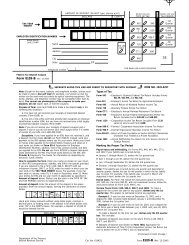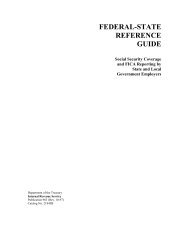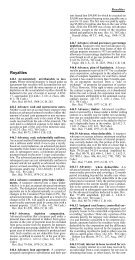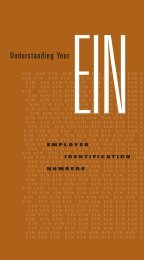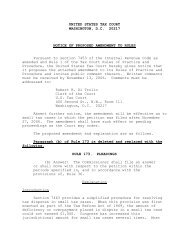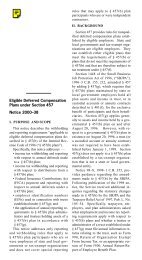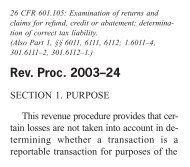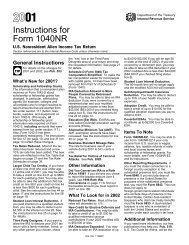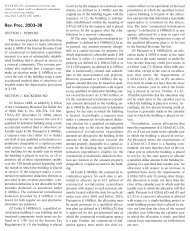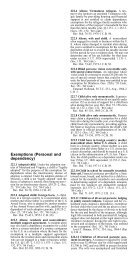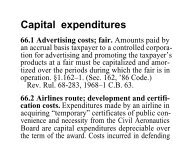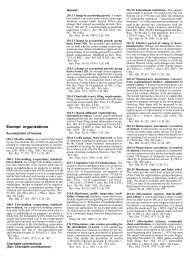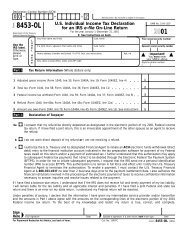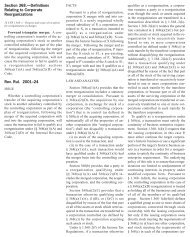Auto Dealerships - Audit Technique Guide - Uncle Fed's Tax*Board
Auto Dealerships - Audit Technique Guide - Uncle Fed's Tax*Board
Auto Dealerships - Audit Technique Guide - Uncle Fed's Tax*Board
Create successful ePaper yourself
Turn your PDF publications into a flip-book with our unique Google optimized e-Paper software.
purely for services. See Treas. Reg. section 1.162-7(a).<br />
Treas. Reg. section 1.162-7(a) compensation for personal services states the following:<br />
There may be included among the ordinary and necessary expenses paid or incurred in carrying on any<br />
trade or business a reasonable allowance for salaries or other compensation for personal services actually<br />
rendered. The test of deductibility in the case of compensation payments is whether they are reasonable<br />
and are in fact payments purely for services.<br />
The test of deductibility mentioned in paragraph (a) above is illustrated in Treas. Reg.<br />
section 1.162-7(b)(1):<br />
Any amount paid in the form of compensation, but not in fact as the purchase price of services is not<br />
deductible. An ostensible salary paid by a corporation may be a distribution of a dividend on stock. This<br />
is likely to occur in the case of a corporation having few shareholders, practically all of whom draw<br />
salaries. If in such a case the salaries are in excess of those ordinarily paid for similar services and the<br />
excessive payments correspond or bear a close relationship to the stock holdings of the officers or<br />
employees, it would seem likely that the salaries are not paid wholly for services rendered, but that the<br />
excessive payments are a distribution of earnings upon the stock. An ostensible salary may be in part in<br />
payment for property. This may occur, for example, where a partnership sells out to a corporation, the<br />
former partners agreeing to continue in the service of the corporation. In such a case it may be found that<br />
the salaries of the former partners are not merely for services, but in part constitute payment for the<br />
transfer of their business.<br />
Treas. Reg. section 1.162-7(b)(2) deals specifically with contingent compensation<br />
arrangements.<br />
The form or method of fixing compensation is not decisive as to deductibility. While any form of<br />
contingent compensation invites scrutiny as a possible distribution of earnings of the enterprise, it does<br />
not follow that payments on a contingent basis are to be treated fundamentally on any basis different from<br />
that applying to compensation at a flat rate * * * [If] contingent compensation is paid pursuant to a free<br />
bargain between the employer and the individual before the services are rendered it should be allowed as a<br />
deduction.<br />
Regulation Section 1.162-8 describes the treatment of excessive compensation if the amounts correspond<br />
or bear a close relationship to stock holdings, and are found to be distribution of earnings and profits, the<br />
excessive payment will be treated as a dividend. Rev. Rul. 79-8, 1979-1 C.B. 92 states that the failure of a<br />
closely held corporation to pay more than an insubstantial portion of its earnings as dividends on its stock<br />
is a very significant factor to be taken into account in determining the deductibility of compensation paid<br />
by the corporation to its shareholder-employees. Conversely, where after an examination of all of the facts<br />
and circumstances (including the corporation’s dividend history) compensation paid to<br />
shareholder-employees is found to be reasonable in amount and paid for services rendered, deductions for<br />
such compensation under Section 162(a) of the Code will not be denied on the sole ground that the<br />
corporation has not paid more than an insubstantial portion of its earnings as dividends on its outstanding<br />
stock.<br />
Good Chevrolet v. Commissioner, T.C. Memo. 1977-291, CCH 34,606(M), held that the<br />
compensation paid to the officers in this case was reasonable. The compensation policy of the<br />
corporate officers had been set prior to when the officers became shareholders and members<br />
of Board of Directors. The officers had always been paid a fixed salary and a monthly bonus.<br />
The court pointed out that "* * * the volume of the new car sales was not due solely to<br />
19-10



